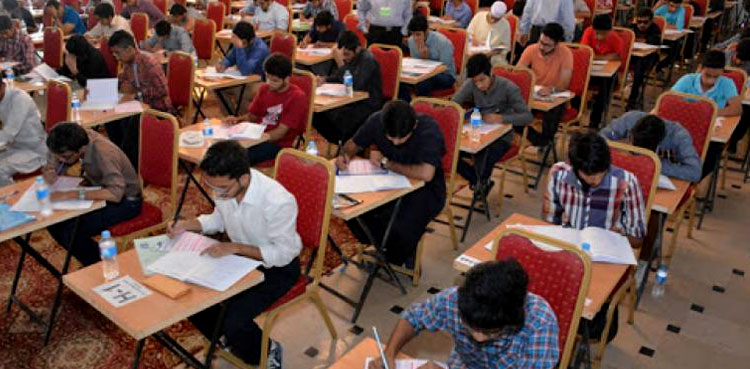PMDC Advances Reforms for Improved MDCAT Standards

Pakistan Medical and Dental Council PMDC has undertaken significant measures to reform and enhance the Medical and Dental College Admission Test MDCAT. By addressing existing challenges and introducing innovative solutions, the council aims to ensure transparency, fairness, and credibility in the examination process. Central to these efforts is the establishment of a specialized committee tasked with driving these reforms. The students can get detailed updates of PMDC Advances Reforms for Improved MDCAT Standards.
Formation of a Committee for MDCAT Reforms
To tackle long-standing issues and improve MDCAT, the PMDC formed a seven-member reform committee representing all provinces. This diverse group is charged with identifying challenges, reducing errors, enhancing transparency, and incorporating IT-driven solutions into the exam process. Key considerations include transitioning to a centralized exam system, adopting a standardized syllabus, and scheduling MDCAT soon after intermediate exams to curtail the influence of private tuition centers, which have gained undue prominence in exam preparation.
Insights from the First Committee Meeting
The inaugural session of the MDCAT reform committee was held at the PMDC office, with PMDC President Prof. Dr. Rizwan Taj extending gratitude to the members for their dedication to this critical initiative. The meeting, chaired by Prof. Dr. Suhail Amin, offered an overview of the 2024 MDCAT process and the legislative framework under the PMDC Act 2022.
The meeting highlighted that a total of 167,772 candidates appeared for MDCAT 2024, including students from Pakistan as well as centers in Dubai and Saudi Arabia. The committee was briefed on performance data, including university-wise outcomes and high-scoring trends. Updates were also provided on the retakes conducted for some universities in Sindh and federally-administered institutions, reflecting the council’s commitment to maintaining examination integrity.
Emphasis on Standardized Syllabus and Skill-Based Assessments
The committee emphasized the need for a unified syllabus to ensure fairness across all regions. The Chairman underlined that developing a consistent, transparent examination system is critical, particularly to address disparities in the difficulty levels of tests administered in different provinces.
Dr. Suhail Amin shared observations from interviews with successful MDCAT candidates, noting a significant gap between their academic scores and overall personal development. He advocated for shifting the exams focus from memorization to evaluating cognitive skills, critical thinking, and ethical understanding. While major structural changes might encounter resistance, he proposed starting with incremental updates, particularly in the area of cognitive-level assessments.
Exploring E-Assessment for Efficiency
Modernizing MDCAT with an electronic assessment e-assessment system was another central theme of the discussion. The Inter Board Committee of Chairmen IBCC introduced the Examination Bible, a comprehensive manual for grades 9-12, aimed at streamlining exam procedures and question development nationwide.
The committee noted that implementing an e-assessment system for multiple-choice questions MCQs is both feasible and secure. This proposed system would rely on center-based examinations rather than internet-dependent platforms, ensuring reliability. With the support of the Higher Education Commission HEC, the council plans to develop secure portals to enhance security and minimize risks of misconduct.
Additionally, the committee reviewed the MDCAT syllabus, which has already undergone a round of revisions, and proposed further enhancements to align it with global standards. They emphasized the importance of developing a robust question bank that tests not only subject knowledge but also higher-order thinking and ethical judgment.
Establishment of Sub-Committees and Strategic Goals
To ensure focused progress, the PMDC established three sub-committees, each tasked with specific objectives:
Syllabus Development Sub-Committee
This four-member team will design a unified syllabus in collaboration with local and international education boards. They will also create a detailed Table of Specifications TOS and develop a sustainable question bank plan.
E-Assessment Sub-Committee
Comprising three members, this group will propose technical frameworks, cost analyses, and a detailed plan for implementing centralized e-MDCAT exams.
Policy Formulation Sub-Committee
This two-member committee will draft a policy document to streamline the implementation of a national MDCAT system.
All sub-committees have been tasked with submitting their drafts by December 2024. These drafts will undergo review in subsequent meetings to finalize an actionable reform strategy.
Commitment to Transparency and Quality
In his concluding remarks, PMDC President Prof. Dr. Rizwan Taj reiterated the councils dedication to upholding the integrity of MDCAT. Addressing concerns about previous examination controversies, he stressed the importance of ensuring a fair and controversy-free process. He acknowledged past shortcomings, including instances of misconduct during the exams, and emphasized that the proposed reforms aim to restore public trust.
The meeting ended with the committee identifying three primary focus areas: Content, Conduct, and Policy. Future tasks were delegated, and deadlines were set to ensure steady progress.
Through these comprehensive reforms, PMDC seeks to modernize MDCAT, making it a for medical and dental education in Pakistan. The council’s commitment to integrating technology, standardizing procedures, and prioritizing assessments of higher cognitive abilities underscores its vision for a transparent and equitable examination system.















